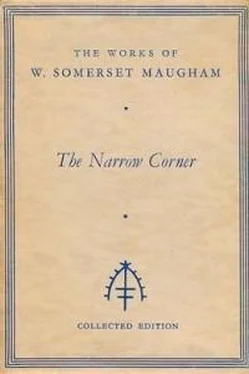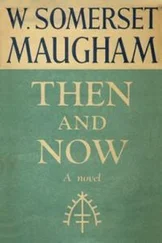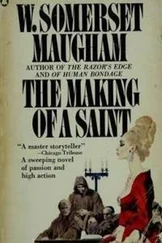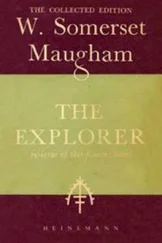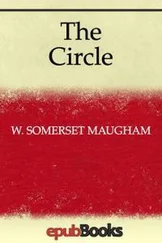Уильям Моэм - The Narrow Corner
Здесь есть возможность читать онлайн «Уильям Моэм - The Narrow Corner» — ознакомительный отрывок электронной книги совершенно бесплатно, а после прочтения отрывка купить полную версию. В некоторых случаях можно слушать аудио, скачать через торрент в формате fb2 и присутствует краткое содержание. Год выпуска: 2021, Издательство: epubBooks Classics, Жанр: Классическая проза, на английском языке. Описание произведения, (предисловие) а так же отзывы посетителей доступны на портале библиотеки ЛибКат.
- Название:The Narrow Corner
- Автор:
- Издательство:epubBooks Classics
- Жанр:
- Год:2021
- ISBN:нет данных
- Рейтинг книги:5 / 5. Голосов: 1
-
Избранное:Добавить в избранное
- Отзывы:
-
Ваша оценка:
- 100
- 1
- 2
- 3
- 4
- 5
The Narrow Corner: краткое содержание, описание и аннотация
Предлагаем к чтению аннотацию, описание, краткое содержание или предисловие (зависит от того, что написал сам автор книги «The Narrow Corner»). Если вы не нашли необходимую информацию о книге — напишите в комментариях, мы постараемся отыскать её.
The Narrow Corner — читать онлайн ознакомительный отрывок
Ниже представлен текст книги, разбитый по страницам. Система сохранения места последней прочитанной страницы, позволяет с удобством читать онлайн бесплатно книгу «The Narrow Corner», без необходимости каждый раз заново искать на чём Вы остановились. Поставьте закладку, и сможете в любой момент перейти на страницу, на которой закончили чтение.
Интервал:
Закладка:
“The Kingdom of Heaven,” smiled Erik.
“And where is that?” asked Fred.
“In my own mind.”
“I do not wish to intrude upon this philosophic conversation,” said the doctor, “but I’m bound to tell you that I’m suffering from the pangs of thirst.”
Erik, with a laugh, raised his huge body from the wall on which he had been sitting.
“The sun will be setting soon, anyhow. Let’s go down and I’ll give you a drink in my house.” He pointed to the volcano that stood over against the west, a bold cone that was silhouetted with exquisite precision against the darkening sky. He addressed himself to Fred. “Would you like to come for a climb to–morrow? You get a grand view from the top.”
“I don’t mind if I do.”
“We must start early, on account of the heat. I could fetch you on the lugger just before dawn, and we’d row over.”
“That’ll do me.”
They strolled down the hill and soon found themselves back in the town.
Erik’s house was one of those they had passed in the morning when on landing they had wandered down the street. Dutch merchants had lived in it for a hundred years, and the firm for which he worked had bought it lock, stock and barrel. It stood within a high, whitewashed wall, but the whitewash was peeling and in places green with damp. The wall enclosed a little garden, wild and overgrown, in which grew roses and fruit trees, wantoning creepers and flowering shrubs, bananas, and two or three tall palms. It was choked with weeds. In the waning light it looked desolate and mysterious. Fire–flies flitted heavily to and fro.
“I’m afraid it’s very neglected,” said Erik. “Sometimes I think I’ll put a couple of coolies to clear up all the mess, but I think I like it like that. I like to think of the Dutch mynheer who used to take his ease here in the cool of the evening, smoking his china pipe, while his fat mevrou sat and fanned herself.”
They went into the parlour. It was a long room with a window at each end, but heavily curtained; a boy came and, standing on a chair, lit a hanging oil lamp. There was a marble floor, and on the walls paintings in oil so dark that you could not see the subjects. There was a large round table in the middle, and round it a set of stiff chairs covered with green stamped velvet. A stuffy and uncomfortable room, but it had the charm of incongruity, and it brought vividly to the mind’s eye a demure picture of nineteenth–century Holland. The sober merchant must have unpacked with pride the furniture that had come all the way from Amsterdam, and when it was neatly arranged he must have thought it very well became his station. The boy brought beer. Erik went over to a little table to put a record on the gramophone. He caught sight of a bundle of papers.
“Oh, here are the papers for you. I sent up for them.”
Fred rose from his chair, taking them, and sat down at the big round table under the lamp. Because of the doctor’s remark while they were up in the old Portuguese fort, Erik put on the beginning of the last act of “Tristan.” The recollection gave an added poignancy to the music. The strange and subtle little tune that the shepherd played on his reed, when he scanned the wide sea and saw no sail, was melancholy with blighted hope. But it was another pang that wrung the doctor’s heart. He remembered Covent Garden in the old days and himself, in evening clothes, sitting in a stall on the aisle; in the boxes were women in tiaras, with pearls round their necks; the King, obese, with great pouches under his eyes, sat in the corner of the omnibus box; on the other side, in the corner, looking over the orchestra, the Baron and the Baroness de Meyer sat together, and she catching his eye bowed. There was an air of opulence and of security. Everything in its grand manner seemed so well–ordered, the thought of change never crossed the mind. Richter conducted. How passionate that music was, how full and with what a melodious splendour it unrolled itself sonorously upon the senses! But he had not heard in it then that something shoddy, blatant and a trifle vulgar, a sort of baronial buffet effect, that now somewhat disconcerted him. It was magnificent, of course, but a little frowsty; his ear had grown accustomed in China to complications more exquisite and harmonies less suave. He was used to a music pregnant with suggestion, illusive and nervous, and the brutal statement of facts a trifle shocked the fastidiousness of his taste. When Erik got up to turn the record over Dr. Saunders glanced at Fred to see what effect those strains were having on him. Music is queer. Its power seems unrelated to the other affections of man, so that a person who is elsewise perfectly commonplace may have for it an extreme and delicate sensitiveness. And he was beginning to think that Fred Blake was not so ordinary as he had at first imagined. He had in him something, scarcely awakened and to himself unknown, like a little flower self–sown in a stone wall that pathetically sought the sun, which excited sympathy and interest. But Fred had not heard a note. He sat, unconscious of his surroundings, staring out of the window. The short twilight of the tropics had darkened into night, and in the blue sky one or two stars twinkled already, but he did not look at them, he seemed to look into some black abyss of thought. The light of the lamp under which he sat threw strange, sharp shadows on his face so that it was like a mask that you hardly recognized. But his body was relaxed, as though a tension had been suddenly withdrawn, and the muscles under his brown skin were loose. He felt the doctor’s cool stare and looking at him forced his lips to a smile, but it was a painful little smile, oddly appealing and pathetic. The beer by his side was untouched.
“Anything in the paper?” asked the doctor.
Fred suddenly flushed scarlet.
“No, nothing. They’ve had the elections.”
“Where?”
“New South Wales. Labour’s got in.”
“Are you Labour?”
Fred hesitated a little, and into his eyes came that watchful look that the doctor had seen in them once or twice before.
“I’m not interested in politics,” he said. “I don’t know anything about them.”
“You might let me have a look at the paper.”
Fred took a copy from the bundle and handed it to the doctor. But he did not take it.
“Is that the latest?”
“No, this is the latest,” answered Fred, putting his hand on the one he had just been reading.
“If you’ve done with it I’ll read that. I don’t know that I’m very keen on news when it’s too stale.”
Fred hesitated for a second. The doctor held him with smiling but determined eyes. Obviously Fred could think of no plausible way to refuse the very natural request. He gave him the paper, and Dr. Saunders drew forward to the light to read it. Fred did not take up any of the other copies of the “Bulletin,” though certainly there were some he could not have seen, but sat pretending to look at the table, and the doctor was conscious that he was closely watching him from the sides of his eyes. There was no doubt that Fred had read in the paper he now held in his hand something that deeply concerned him. Dr. Saunders turned over the pages. There was much election news. There was a London letter and a certain amount of cabled information from Europe and America. There was a good deal of local intelligence. He turned to the police news. The election had given rise to some disorder, and the courts had dealt with it. There had been a burglary at Newcastle. Some man had received a sentence for an insurance fraud. A stabbing affray between two Tonga Islanders was reported. Captain Nichols suspected that it was on account of murder that this disappearance of Fred had been arranged, and there were two columns about a murder that had taken place at a farmstead in the Blue Mountains, but this arose out of a quarrel between two brothers and the murderer, who had given himself up to the police, pleaded self–defence. Besides, it had taken place after Fred and Captain Nichols had sailed from Sydney. There was the report of an inquest on a woman who had hanged herself. For a moment Dr. Saunders wondered whether there was anything in this. The “Bulletin” is a weekly, of literary tendencies, and it dealt with the matter, not summarily, but in a fashion natural to a paper catering to a public to whom the facts in detail had been made known by the dailies. It appeared that the woman had been under suspicion of the murder of her husband some weeks before, but the evidence against her was too slight for the authorities to take action. She had been repeatedly examined by the police, and this, together with the gossip of neighbours and the scandal, had preyed on her mind. The jury found that she had committed suicide while temporarily insane. The coroner, commenting on the case, remarked that with her death vanished the last chance the police had of solving the mystery of the murder of Patrick Hudson. The doctor read the account again, reflectively; it was odd, but it was too brief to tell him much. The woman was forty–two. It seemed unlikely that a boy of Fred’s age could have had anything to do with her. And, after all, Captain Nichols had nothing to go on; it was pure guesswork; the boy was an accountant; he might just as well have taken money that did not belong to him or, pressed by financial difficulties, forged a cheque. If he was connected with some important person politically, that might have been enough to make it advisable to spirit him away for a period. Dr. Saunders, putting the paper down, met Fred’s eyes fixed upon him. He gave him a reassuring smile. His curiosity was disinterested, and he was not inclined to put himself to any trouble to gratify it.
Читать дальшеИнтервал:
Закладка:
Похожие книги на «The Narrow Corner»
Представляем Вашему вниманию похожие книги на «The Narrow Corner» списком для выбора. Мы отобрали схожую по названию и смыслу литературу в надежде предоставить читателям больше вариантов отыскать новые, интересные, ещё непрочитанные произведения.
Обсуждение, отзывы о книге «The Narrow Corner» и просто собственные мнения читателей. Оставьте ваши комментарии, напишите, что Вы думаете о произведении, его смысле или главных героях. Укажите что конкретно понравилось, а что нет, и почему Вы так считаете.
